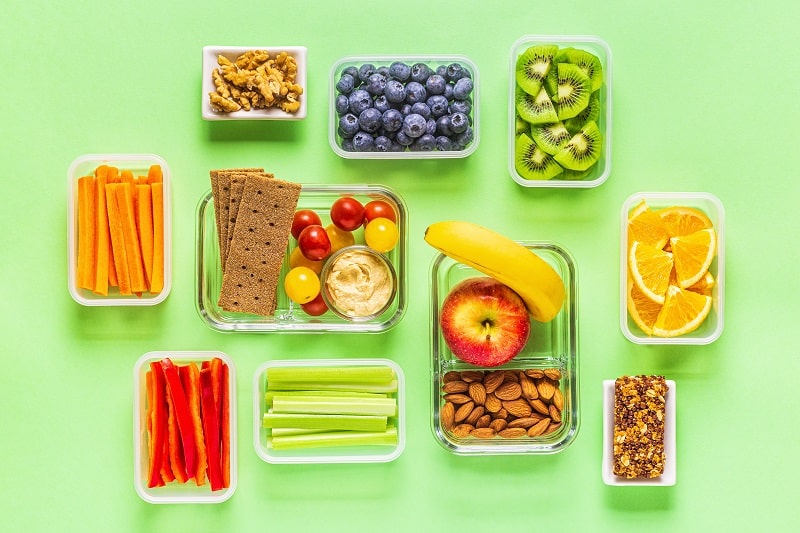Guide to Healthy Snacks is all about managing carbs and sugar. Are you looking for snack ideas that won’t compromise your healthy eating plan? Look no further than this comprehensive guide to healthy snacks while managing carbohydrates. Whether you are following a low-carb diet or managing diabetes, we’ll explore a variety of delicious options that won’t derail your health goals.
Key Takeaways
- Healthy snacking is essential for maintaining energy levels and preventing overeating.
- Choose nutrient-dense snacks that are low in calories and sugar.
- Low-carb and keto-friendly snacks can aid in weight management.
- Diabetic-friendly snacks can help manage blood sugar levels.
- Healthy snacks also provide essential vitamins, minerals, and antioxidants for overall health and well-being.
Understanding Carbohydrates and their Impact on Health
Before we dive into the world of healthy snacking, it’s essential to understand carbohydrates and how they affect our bodies. Carbohydrates are a type of macronutrient found in many foods, including fruits, grains, and vegetables. Our bodies break down carbohydrates into glucose, which serves as the primary source of energy for our cells.
However, not all carbohydrates are created equal. There are two main types of carbohydrates: simple and complex. Simple carbohydrates, also known as “bad carbs,” are found in sugary foods like candy, soda, and processed snacks. These carbs are easily digested and can cause blood sugar spikes, leading to energy crashes and cravings.
Complex carbohydrates, on the other hand, are found in foods like whole grains, fruits, and vegetables. These carbs take longer to digest and don’t cause the same blood sugar spikes as simple carbs. They’re also rich in fiber, which helps us feel full and supports healthy digestion.
For individuals managing their carbohydrate intake, such as those following a diabetic diet, it’s crucial to choose low glycemic snacks. These snacks have a lower impact on blood sugar levels and can help keep glucose levels in a healthy range.
Now that we understand carbohydrates let’s explore some healthy snack options that can help manage your carbohydrate intake.
Importance of Healthy Snacking
Snacking is often seen as a guilty pleasure, but it can actually play a vital role in maintaining energy levels and preventing overeating during main meals. However, not all snacks are created equal. Choosing nutrient-dense snacks that are low in calories and sugar is crucial in ensuring you stay on track with your health goals.
Healthy snacking is also important for managing blood sugar levels. Consuming snacks that are high in sugar or refined carbohydrates can lead to blood sugar spikes and crashes, while low-sugar snacks can help stabilize blood sugar levels and prevent cravings.
When selecting healthy snacks, focus on those that are low in calories and high in nutrients. Fresh fruits and vegetables, whole-grain crackers, and low-fat dairy products are all great options. Additionally, incorporating lean protein, healthy fats, and fiber into your snacks can help you feel fuller longer and provide sustained energy.
With a little creativity and planning, healthy snacking can be both delicious and satisfying. Try preparing snack packs of fresh fruits and veggies or making homemade trail mix with nuts and seeds to keep on hand when hunger strikes. By choosing low-calorie, low-sugar snacks, you can snack guilt-free and support your overall health and wellness.
Low-Carb Snack Options for Weight Management
Snacking can be a challenge when trying to manage carbohydrate intake for weight loss. Fortunately, there are plenty of low-carb snack options that will keep you satisfied and on track with your goals. Here are some ideas:
| Snack | Carbohydrates | Protein |
|---|---|---|
| Celery and Peanut Butter | 6g | 4g |
| Hard-Boiled Egg | 0.6g | 6g |
| String Cheese | 1g | 7g |
| Nuts (almonds, pistachios, walnuts) | 5-6g | 6g |
These snacks are not only low in carbohydrates, but also high in protein and healthy fats, making them ideal for weight management. Remember to keep portions in check and incorporate these snacks into a well-balanced diet.
Keto-Friendly Snack Ideas for Ketogenic Diets
If you’re following a ketogenic diet, finding snacks that are low in carbohydrates and high in healthy fats is essential to staying in ketosis. Here are some keto-friendly snack ideas:
| Snack | Net Carbs | Fat | Protein |
|---|---|---|---|
| Hard-boiled eggs | 0.6 g | 5 g | 6 g |
| Avocado | 2 g | 15 g | 2 g |
| Beef jerky (look for brands without added sugars) | 5 g | 1 g | 9 g |
| String cheese | 1 g | 6 g | 8 g |
| Nuts (almonds, pecans, macadamia nuts, etc.) | 1-4 g (depending on the type) | 14-21 g (depending on the type) | 2-3 g (depending on the type) |
These snacks are not only low-carb but also provide healthy fats and protein, keeping you satiated between meals. Be sure to check the net carb count on any packaged snacks as some may have hidden sugars that can kick you out of ketosis.
Diabetic-Friendly Snacks for Managing Blood Sugar
When managing diabetes, choosing the right snacks can be challenging. It’s important to opt for diabetic-friendly snacks that are low in sugar and carbohydrates to prevent blood sugar spikes. Here are some delicious and nutritious snack options to help manage blood sugar levels:
| Snack | Carbohydrates (g) | Protein (g) | Fiber (g) | Glycemic Index |
|---|---|---|---|---|
| Hard-boiled eggs | 0.6 | 6.3 | 0 | 0 |
| Celery sticks with almond butter | 6 | 4 | 2.5 | 0 |
| Non-fat plain Greek yogurt with berries | 17 | 19 | 3 | 42 |
| Sliced cucumbers with hummus | 6 | 4 | 2 | 0 |
Other diabetic-friendly snacks include low-sugar fruit such as berries, a handful of nuts, or a small serving of cheese. It’s important to pay attention to portion sizes and choose snacks that fit within your daily carbohydrate limit.
Additionally, snacks with a low glycemic index are ideal for managing blood sugar levels. These snacks include whole fruits, vegetables, and whole grains. Low glycemic snacks help prevent blood sugar spikes and keep you feeling full for longer periods of time.
Remember to consult with a healthcare professional or registered dietitian to determine the best snack options for your individual dietary needs.
Nutritious Snacks for Overall Health and Well-Being
Snacking can be an opportunity to nourish your body with essential nutrients and support optimal health. Below are some healthy snack options to consider:
| Snack | Description |
|---|---|
| Apple slices with almond butter | Apples are high in fiber and antioxidants, while almond butter provides healthy fats and protein for satiety. |
| Carrots and hummus | Carrots are a good source of beta-carotene and fiber, while hummus offers protein and healthy fats. |
| Greek yogurt with berries | Greek yogurt is an excellent source of protein and calcium, while berries are rich in antioxidants and fiber. |
| Hard-boiled eggs | Eggs are a nutrient-dense snack rich in protein, vitamins, and minerals. |
| Trail mix | A homemade trail mix with nuts, seeds, and dried fruit can provide energy and nutrients, while also satisfying your sweet tooth. |
When choosing snacks for overall health and well-being, focus on whole foods that are high in nutrients and low in added sugars. Keep portion sizes in mind and aim for snacks that are around 100-200 calories.
Remember to also consider your carbohydrate intake when selecting snacks, particularly if you are managing diabetes or following a low-carb diet. By making mindful choices and incorporating these nutritious snack options, you can support your health while managing carbohydrates.
Smart Snacking Tips and Tricks
Managing carbohydrates while snacking on healthy options can be challenging. Here are some tips to help you make smart snacking choices:
- Choose snacks high in fiber and protein, as they keep you feeling full for longer.
- Avoid snacks high in sugar, as they can lead to energy crashes and blood sugar spikes.
- Portion control is key! Pre-portion snacks into individual servings to avoid overeating.
- If you’re craving something sweet, opt for fresh fruit or a small amount of dark chocolate.
- Trail mix with nuts and seeds is a great option for healthy fats, protein, and fiber.
By incorporating these tips into your snacking routine, you’ll be able to manage your carbohydrate intake while enjoying delicious, healthy snacks.
Conclusion
By incorporating healthy snacks into your diet while managing carbohydrates, you can maintain a balanced, nutrient-dense diet that supports optimal health and well-being. Remember to choose snacks that are low in calories and sugar, high in fiber and protein, and rich in vitamins and minerals to maximize their nutrition benefits.
Don’t be afraid to get creative with your snack choices, incorporating a variety of fruits, vegetables, nuts, and seeds into your diet. And always consult with a healthcare professional or registered dietitian to ensure your snack choices align with your specific dietary needs.
With a little planning and mindfulness, healthy snacking can become a fun and tasty part of your daily routine. So go ahead and indulge in a delicious and nutritious snack today!
FAQ
What are some examples of healthy snacks?
Some examples of healthy snacks include fresh fruits, vegetables with hummus, Greek yogurt, nuts and seeds, and whole grain crackers with cheese.
Can I still enjoy snacks while managing carbohydrates?
Yes! It’s important to choose snacks that are low in carbohydrates and high in fiber and protein. This can help manage blood sugar levels and keep you feeling satisfied.
Are there low-carb snack options for weight management?
Absolutely! Some low-carb snack options for weight management include celery sticks with peanut butter, hard-boiled eggs, beef jerky, and cottage cheese with berries.
What are some keto-friendly snack ideas?
For those following a ketogenic diet, keto-friendly snack options include avocados, pork rinds, cheese crisps, and almond or coconut flour-based baked goods.
Can you recommend diabetic-friendly snacks?
Certainly! Diabetic-friendly snacks include sugar-free yogurt, carrot sticks with ranch dip, sugar-free dark chocolate, and sugar-free nut butter.
How can I snack in a nutritious way?
Opt for snacks that are nutrient-dense, such as fresh or dried fruits, raw veggies with homemade dip, homemade trail mix with nuts and seeds, and air-popped popcorn.
Any tips for making smart snacking choices?
Absolutely! Some smart snacking tips include portion control, reading labels for carbohydrate content, planning ahead and preparing snacks in advance, and choosing snacks that combine protein and fiber.
Can I still enjoy sweet snacks while managing carbohydrates?
Yes! There are many sweet snacks that can be enjoyed while managing carbohydrates, such as sugar-free gelatin, berries with whipped cream, and homemade low-carb desserts using natural sweeteners.
Where can I find more information about healthy snacking and managing carbohydrates?
For more information about healthy snacking and managing carbohydrates, consult with a healthcare professional or a registered dietitian who can provide personalized advice based on your specific dietary needs.
About the Author
Zovinar is a seasoned Food Regulatory Affairs Professional, with over two decades of experience in advocating for consumer protection and product safety. Her academic prowess is grounded in a Bachelor of Honors in Science from the University of Toronto and further enriched by a Master’s in Arts from York University and a Master’s of Science from Northeastern University. These qualifications have been instrumental in shaping her as an expert in food safety and regulation.
At the heart of Zovinar’s career is a deep-rooted passion for ensuring consumer safety and advocating for their rights. Her commitment to these principles is evident in her approach to providing well-researched, scientifically-backed information through her dedicated website. This platform reflects not just her extensive knowledge and experience, but also her dedication to promoting transparency and quality in the food and product safety industry.
Join Zovinar on her mission to safeguard consumer interests and uphold the highest standards in food regulatory affairs.







